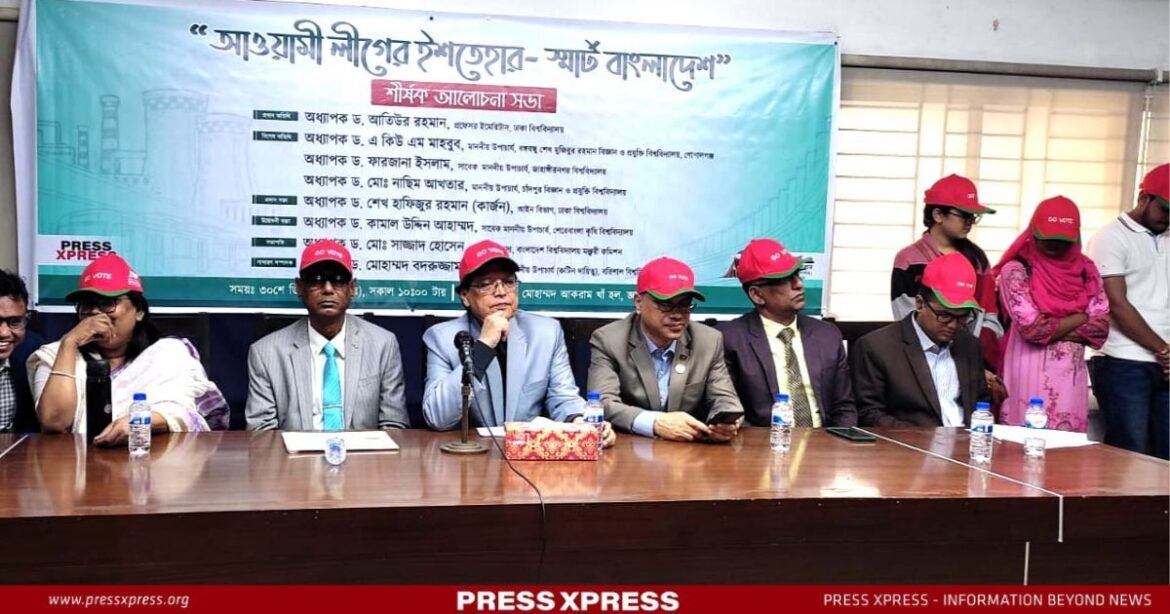Delving into the Awami League’s manifesto and emphasizing the vision for a Smart Bangladesh, a comprehensive discussion unfolded at the Akram Kha Hall, National Press Club, organized by the Education, Research, and Development Forum of Bangladesh (ERDFB), on December 30, 2023, at 10:00 AM. With esteemed guests and speakers, the event was committed to providing insights into critical aspects and initiatives outlined in the manifesto.
Leading the event as the main speaker was Professor Dr. Sheikh Hafizur Rahman (Curzon) from the Department of Law at the University of Dhaka. Former Vice-Chancellor of Sher-e-Bangla Agricultural University, Prof. Dr. Kamal Uddin Ahmed, delivered the opening remarks, while the central hosting duties were managed by Prof. Dr. Mohammad Badruzzaman Bhuiyan, the Honorable Vice-Chancellor (Routine Duties) of Barisal University.
You can also read: What to Expect from Awami League’s Manifesto 2024?
The event was graced by the esteemed presence of Dr. Atiur Rahman, Professor Emeritus at the University of Dhaka, who held the position of Chief Guest. Among the special guests were Professor Dr. Farzana Islam, Former Honorable Vice-Chancellor of Jahangirnagar University, and Professor Dr. Md. Nasim Akhtar, Honorable Vice-Chancellor of Chandpur University of Science and Technology and A.Q. M. Mahbub, the Vice-Chancellor of Bangabandhu Sheikh Mujibur Rahman Science and Technology University.
Professor Dr. Md. Sazzad Hossain Honorable Member, University Grants Commission, Bangladesh served as the President of the program.
Key Discussion points from the event
Former Vice-Chancellor of Sher-e-Bangla Agricultural University Prof. Dr. Kamal Uddin Ahmedcommented–“On December 12, 2022, the Prime Minister unveiled the vision of a Smart Bangladesh, and she is currently dedicated to translating this vision into reality. The comprehensive manifesto delineated four fundamental pillars: smart citizen, smart economy, smart government and smart society. Comprising nearly 20 discerning points, the manifesto provides a roadmap for her prospective initiatives aimed at advancing the nation. Sheikh Hasina, is an exceptional leader, she demonstrated her humility by extending apologies within the manifesto for any inadvertent mistakes to the citizens of the nation.”
Professor Dr. Sheikh Hafizur Rahman (Curzon) from the Department of Law at the University of Dhaka discussed Bangladesh’s development over the last one and a half decades (15 years).
“In 2006, the per capita income was $543, and by 2023, it has risen to $2793. The budget increased from 61,000 crore taka in 2006 to 7,61,785 crore taka in 2023. Remittances also saw a substantial growth, from $4.8 in 2006 to $24.03 in 2023. The revenue income rose from 37,870 crore in 2006 to 500,000 crore in 2023.

Additionally, there has been a remarkable reduction in the poverty rate, declining from 41.51% in 2006 to 18.7%. Life expectancy has increased to 72.8 years, accompanied by a decrease in maternal and child death rates. Bangladesh has achieved a milestone of 28,562 MW of power generation. The establishment of community clinics and an increase in the literacy rate to 76.8% showcase further progress. The participation of women in education has reached an impressive 98.25%.
Furthermore, initiatives such as the construction of 8,47,414 houses for homeless people using Khas land have been undertaken. Social governance has witnessed a revolution with the introduction of allowances for widows, transgender individuals, and other vulnerable groups. Notably, there has been a groundbreaking change in naming conventions, with both mother and father’s names included for a child.
Moreover, revolutionary steps in social services include the establishment of digital centers, the Joyeeta Foundation, and Sheikh Kamal IT centers.”
A.Q. M. Mahbub, the Vice-Chancellor of Bangabandhu Sheikh Mujibur Rahman Science and Technology University, emphasized, “Bangladesh has made significant progress in the agricultural sector. The country’s rankings in the production of rice, vegetables, and fish signify its development. With fertile land comprising 100% cultivable land, Bangladesh is currently undergoing a digital revolution in agriculture. It is imperative to increase farmers’ income, and the Prime Minister is actively working towards ensuring this. In addition to cultivating rice and wheat, we should diversify into growing various other crops to enhance export potential. The southern region, in particular, has high protein potential, and it is essential to harness it effectively.”
Dr. Atiur Rahman, Professor Emeritus at the University of Dhaka, highlighted“Manufacturing contributes to 37% of the GDP, a significant increase from 10% in 1972. According to a report from the Credit Bureau Report (CBR) yesterday, Bangladesh is projected to become the 20th largest economy by 2038. Mastercard International predicts a consistent annual growth rate of 6.3% for Bangladesh, securing its position as the second-largest economy in Asia.
This manifesto addresses the current challenges we face, with the primary focus on the economic obstacle. The manifesto outlines various challenges, and among them, poverty remains a pressing issue, with nearly 3 crore people still below the poverty line. The goal is to make Bangladesh poverty-free by 2040. The manifesto emphasizes the importance of employment to boost purchasing power, making the reduction of commodity rates the second priority. To tackle these challenges, 11 sectors have been prioritized.
In an effort to minimize challenges, the manifesto proposes reducing interest rates. Sheikh Hasina envisions a shift from urban-centric income generation to empowering villages.
The manifesto also underscores key issues such as climate change, law and order enforcement, the spirit of the liberation war, and the commitment to a corruption-free Bangladesh.”
Finally, Professor Dr. Md. Sazzad Hossain, an Honorable Member of the University Grants Commission, concluded the event by summarizing the key points mentioned by the previous speakers regarding the manifesto. He also extended a warm welcome to young voters, encouraging them to actively participate in the election. Additionally, he urged journalists and teachers to educate children about the importance of voting and to disseminate accurate information on the subject.


